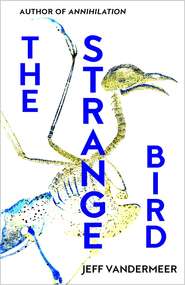По всем вопросам обращайтесь на: info@litportal.ru
(©) 2003-2024.
✖
Borne
Автор
Год написания книги
2018
Настройки чтения
Размер шрифта
Высота строк
Поля
“Surprising. It is from the Company. At least, created inside the Company.” He’d worked for the Company in its heyday, a decade ago, before being “cast out, thrown away,” as he put it in a rare unguarded moment.
“But not by the Company?”
“It has the economy of design usually only achieved by committees of one.”
When Wick danced around a subject, it made me nervous. The world was already too uncertain, and if I looked to Wick for anything besides security, it was for knowledge.
“Do you think it’s a mistake?” I asked. “An afterthought? Something put out in the trash?”
Wick shook his head, but his tight frown didn’t reassure me. Wick was self-sufficient and self-contained. So was I. Or so we both thought. But now I felt he was withholding some crucial piece of information.
“Then what?”
“It could be almost anything. It could be a beacon. It could be a cry for help. It could be a bomb.” Did Wick really not know?
“So maybe we should eat it?”
He laughed, shattering the architectural lines of his face. The laughter didn’t bother me. Not then, at least.
“I wouldn’t. Much worse to eat a bomb than a beacon.” He leaned forward, and I took such pleasure from staring at his face that I thought he had to notice. “But we should know its purpose. If you give it to me, I can at least break it down into its parts, cycle it through my beetles. Discover more that way. Make use of it.”
We were, in our way, equals by now. Partners. I sometimes called him my boss because I scavenged for him, but I didn’t have to give him the sea anemone. Nothing in our agreement said I had to. True, he could take it while I slept … but this was always the test of our relationship. Were we symbiotic or parasitic?
I looked at the creature lying there on the table, and I felt possessive. The feeling rose out of me unexpected, but true—and not just because I’d risked Mord to find Borne.
“I think I’ll keep it for a while,” I said.
Wick gave me a long look, shrugged, and said, too casually, “Suit yourself.” The creature might be unusual, but we’d seen similar things before; perhaps he believed there was little harm.
Then he took a golden beetle from his pocket, put it in his ear, and his eyes no longer saw me. He always did that after something reminded him of the Company in the wrong way, unleashing a kind of self-despising rage and melancholy. I had told him confessing whatever had happened there might bring him peace, but he always ignored me. He told me he was shielding me. I did not believe him. Not really.
Perhaps he was trying to forget the details of some personal failure he could not forgive, something he’d brought on himself or actions he’d taken toward the end. Yet the job he’d chosen—or been forced into—after leaving could only remind him of the Company hour by hour, day by day. It was hard to guess because I didn’t know much about biotech, and I felt the answers I wanted from him might be technical, that maybe he thought I wouldn’t understand the details.
If I’d had his full attention, if Wick had argued with me over Borne, the future might have been different. If he’d insisted on taking Borne from me. But he didn’t. Couldn’t.
WHERE I LIVED, AND WHY
By the time I found Borne, I was entangled with Wick in so many ways. We were bound by our mutual safe place: the Balcony Cliffs, which existed on the northeast fringe of the city, overlooking the poisoned river. To the west as the city sloped toward sea level lay the territory of the Magician. To the south, across desolation and oases both, the remnants of the Company, protected by Mord. Much of all of this sprawled across a vast dry seabed that extended into the semiarid plain beyond the city.
Wick had found the Balcony Cliffs and held them for a time without me. But only by inviting me in had he held on to that place. He provided his dwindling supply of biotech and chemical deceptions and I provided a talent for building traps both physical and psychological. Using Wick’s blueprints, I’d reinforced or hollowed out the most stable corridors and the rest now ended in hidden pits or floors strewn with broken glass or worse. I used a terrifying nostalgia: book covers with death’s-heads drawn on them, a bloody cradle never meant to break, a few dozen pairs of shoes (some with mummified feet still in them). The brittle remains of a doglike animal that had wandered in and gotten lost hung from one ceiling, while the graffiti added to the wall opposite would haunt an intruder’s nightmares. If they knew how to read. A horror show linked to Wick’s pheromones and hallucinogens, activated by trip wire. Attacks had come and squatters tried their luck, and always we had fended them off.
One route we’d made led to Wick’s rooms, another to the stairs in the former lobby that granted access to a blind hidden near the top mulch. Another route came after subterfuge to the converted swimming pool where Wick stirred a vat of seething biotech creations like a mad scientist—and then from there to the cliff where lay the balconies that had given the place its name.
From the center, near Wick’s workplace, the lines in my head were drawn most urgently to the southern edge of the mound, which faced the Company across the great broken divide of the city’s southwest flank, the confusion deliberately multiplied, my purpose to create a maze for any unexpected visitors … before simplifying again at the exit to three passageways, only one of which led anywhere safe, and before that the door, which from the outside appeared to just be a part of the mound, obliterated by an inspiration of moss and vines. A strong smell of carrion, one of Wick’s most inspired distortion pheromones, grew unbearable closest to the door. Even I had trouble leaving by that entrance.
Throughout the warren we had made of the Balcony Cliffs there now existed allegiances that felt intimate—more intimate even than our sleeping arrangements. Corridors? Tunnels? Even those kinds of distinctions had been lost under our excavating rule and Wick’s addition of special spiders and other insects. I kept track of my traps with a map, but Wick, Company-savvy, used a flounder-creature in a shallow pan of water as his command and control, an ever-changing blueprint traced delicate across its back.
At some point, just as our systems of defense had become entwined, so too had our bodies, and that had wrought an unexpected synergy. What had been created from extremes of loneliness, of need, had moved beyond mutual comfort into friendship and then toward some amorphous frontier or feeling that could not be love—that I refused to call love.
In weak moments, I would run my hand across his wiry chest and tease him about his pale, almost translucent skin against the deep brown of my thighs, and for a time I would be happy at the hidden center of our Balcony Cliffs. It suited me that we could be lovers there and retreat to being mere allies in the aftermath.
But the truth is, when we were together on those nights, I knew that Wick lost every part of himself and let himself be vulnerable. I felt this quite strongly, even if I might be wrong. And if I held back something from Wick because of it, still I let the Balcony Cliffs in, connected by something almost like lasers. These lines that radiated out from both of us surged from body and brain and through the rooms our talents kept safe. Sensors, trip wires, sensitive to touch and vibration, as if we lay always at the center of something important. Even lying there, beneath me, Wick could not be free of that connection.
There was also the thrill of secrecy, for to preserve our security, we could not be seen outside together—left by different pathways, at different times—and some of that thrill entered into our relationship. Anyone passing furtive far above us would have thought that underfoot, beneath the copse of sickly pines, lay only a vast midden, an old garbage dump with dozens of layers of crumbled girders, human remains, abandoned refrigerators, firebombed cars—crushed into a mulch that had a springy, almost jaunty feel.
But beneath that weight lay us, lay the stalwart roof of the Balcony Cliffs and the cross-section of body that served as our home—the lines that connected a woman named Rachel to a man named Wick. There was a secret shape to it all that lived inside us, a map that slowly circled within our minds like a personal cosmology.
This, then, is where I had brought my sea anemone named Borne—into this cocoon, this safe haven, this vast trap that took time and precious resources to maintain, while somewhere a ticking clock kept track of the time we had left. Wick and I both knew that no matter how much raw biotech material he created or bartered for, the beetle parts and other essentials he had taken from the Company so long ago would run out. My physical traps without Wick’s almost uncanny reinforcement would not keep scavengers out for long.
Every day brought us closer to a point where we would have to redefine our relationship to the Balcony Cliffs, and to each other. And, in the middle of all routes, my apartment, where, pulled taut by our connections, we fucked, we screwed, we made love, equidistant from any border that might encroach, any enemy that might try to enter. We could be greedy there and selfish there, and there we saw each other fully. Or at least thought we did, because whatever we had, it was the enemy of the world outside.
That first night after I had brought Borne into our home, we lay there in my apartment and listened to the remote, hollow sound of heavy rain smashing into the mossy surface far above. We both knew it was not real rain; real rain in this city came to us ethereal and brief, and thus we did not venture out. Even real rain was often poison.
We did not speak much. We didn’t have sex. We just lay there in a comfortable tangle, with Borne on a chair as far from us as possible, in the corner of the bedroom. Wick had strong hands with fingertips worn almost smooth from his years of handling the materials that went into his vats of proto-life, and I liked to hold his hands.
This is how far we had come, that we could be silent and we could be still together. But even then, that first night, the presence of Borne changed things and I didn’t know if part of the silence was because of that.
In the morning, we peeked out through one of our secret doors to find the cracked earth writhing with the death throes of thousands of tiny red salamanders. So intricate, their slow-questing limbs, their obsidian eyes. So much like a mirage. A mosaic of living question marks that had rained down from the darkened sky without meaning. And already to the west we could hear the rage of Mord and feel the tremor of his passage. Rage against this illogical rain or against someone or something else?
Once, comets had appeared in the heavens and people mistook them for celestial creatures. Now we had Mord, and salamanders. What did they portend? What fate was the city working toward? Within minutes of the sun hitting their bodies the salamanders dissolved into liquid, absorbed by the earth so that only an off-red sheen like an oil slick remained behind, dotted with the tiny tracks of investigating animals.
Wick did not seem much concerned about the salamanders despite his need to replenish the supplies in his swimming pool.
“Contaminated,” he said, which I had known already from the look on his face.
WHY I CALLED HIM BORNE AND HOW HE CHANGED
I called the creature Borne because of one of the few things Wick had told me about his time working for the Company. Remembering a creature he’d created, Wick had said, “He was born, but I had borne him.”
When I wasn’t scavenging for myself or Wick, I took care of Borne. This required some experimenting, in part because I had never taken care of anyone or anything before—except some hermit crabs as a child and a stray dog for a day that I had to give up. I had no family, and my parents had died before I had arrived in the city.
I knew nothing about Borne and treated him like a plant at first. It seemed logical, from my initial observations. The first time Borne felt comfortable enough to relax and open up, I was sitting down to a quiet dinner of old Company food packets I’d found buried in a half-collapsed basement. He was sitting on the table in front of me, as enigmatic as ever. Then, mid-chew, I heard a whining noise and a distinctly wet pucker. As I set down the packet, the aperture on top of Borne widened, releasing a scent like roses and tapioca. The sides of Borne peeled back in segments to reveal delicate dark-green tendrils that even in their writhing protected the still-hidden core.
Without thinking, I said, “Borne, you’re not a sea anemone at all—you’re a plant!”
I’d already gotten into the habit of talking to him, but at the sound of my voice Borne snapped back into what I thought of as his “defensive mode” and didn’t relax again for a full day. So I put him on a plate in the bathroom, on a shelf beneath a slanted hole in the ceiling that let in improbable sunlight from far above. I savored that green-tinged, musty light in the mornings before I went out to do Wick’s work.
By the end of the second day, Borne had taken on a yellow-pink hue and the tenacity of his defensive posture hinted at either sickness or religious ecstasy, both of which I had seen too often out in the city. He smelled overcooked. I removed Borne from the shelf and returned him to the kitchen table. However, by then I noticed that the worms that composted my bathroom waste and excreted the nutrients Wick used in his vat had “disappeared.”
Now I knew a few useful things. Borne could overdose on sunlight. Borne was a glutton for compost worms. Borne could move around by himself but wouldn’t while I was there. So Borne chose to overdose on sunlight. Nothing now indicated that Borne was malformed or in any way a mistake.
I upgraded Borne from plant to animal, but still did not reclassify him as “purposeful.” I should have, though, because following his bathroom adventures, Borne made no attempt to disguise his movements. I would come home to find him in the bedroom when he had been in the kitchen when I’d left—or back in the hallway when he’d been on the living-room floor. Upon my approach, Borne always remained silent and unmoving, and I could never catch him in the act. I sensed amusement from Borne over this, but I was probably projecting. This made me smile. It became a kind of game, to guess where he might be when I returned. I looked forward to coming home more than usual.
When I mentioned this to Wick, while giving him a half-dead azure slug I’d found near the Company, he didn’t find it funny.
“You’re not worried?”
“Why should I be worried?”










